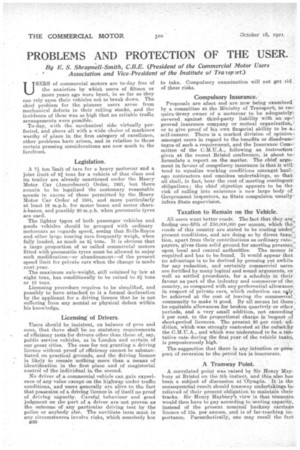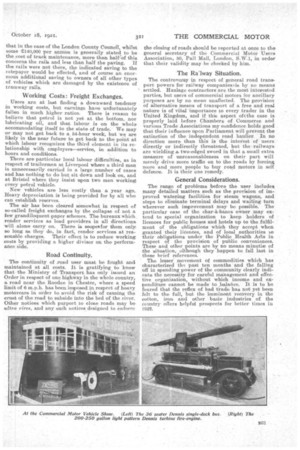PROBLEMS AND PROTECTION OF THE USER.
Page 26

Page 27

If you've noticed an error in this article please click here to report it so we can fix it.
By E. S. Shrapnell-Smith, C.B.E. (President of the Commercial Motor Users . Association and Vice-President of the Institute of Traispnl.)
USERS of commercial motors are to-day free of the anxieties by which users of fifteen or more years ago were beset, in so far as they can rely upon their vehicles not to break down. The thief problem for the pioneer users arose from mechanical defects in their rolling stocks, and the incidence of these was so high that no reliable traffic arrangements were possible. To-day, with the mechanical side virtually perfected, and above all with a wide choice of machines worthy of place, in the first category of excellence, other problems have arisen, and in relation to these certain pressing considerations are now much to the forefront.
Legislation.
A 7 ton limit of tare for a heavy motorcar and a joint limit of 91 tons for a vehicle of that class and its trailer are already sanctioned under the Heavy. Motor Car (Amendment) Order, 191, but thero remain to be legalized the customary reasonable speeds in excessof those permitted by the Heavy Motor Car Order of 1904, and more particularly at least 16 m.p.h. for motor buses and motor chars -banes, and and possibly 20 m.p.h. when pneumatic tyres are used.
The lighter types of both passenger vehicles and. goods vehicles should be grouped with ordinary motorcars as regards speed, seeing that Rolls-Royce and other large touring cars frequently weigh, when fully loaded, as much as 2i tons. it is obvious that a large proportion of so called commercial motors fitted with pneumatic tyres must be allowed to enjoy such modification—or abandonment—of the present speed limit for private ears when the change is made next year.
The maximum axle-weight, still retained by law at eight tons, has conditionally to be raised to 9i tons or 10 tons.
Licensing procedure requires to be simplified, and possibly to have attached to it a formal declaration by the applicant for a driving licence that he is not suffering from any mental or physical defect within his knowledge.
Licensing of Drivers.
Users should be insistent., on balance of pros and cons that there shall be no statutory requirements of efkciency tests for drivers other than those of, say, public service vehicles, as in London and certain of our great cities. The case for not granting a driving licence without proof of efficiency cannot be substantiated, on practical grounds, and the driving licence is likely to remain nothing more than a means of identification in the first place and of magisterial control of the individual in the second.
No driver of a, commercial vehicle can gain experience of any value except on the highway under traffic conditions, and users generally are alive to the fact that possesion of a driving licenCe is of itself no proof of driving capacity. Careful behaviour and good judgment on the part of a driver are not proven as the outcome of any particular driving test by the police or anybody else. The novitiate term must in any circumstances involve risks, which somebody has D30 to take. Compulsory examination will not get rid of these risks.
Compulsory Insurance.
Proposals are afoot and are now being examined by a committee at the Ministry of Transport, to require Asvery owner of a motorcar to be adequately covered against third-party liability with an approved insurance company or mutual organization, or to give proof of his own fina,ncial ability to be a, self-insurer. There is a marked division of opinion. amongst amongst users in regard to the benefits or disadvan..1 togas of such a. requirement, and the Insurance CO211-' mitten of the C.M.U.A., following an instruction given at the recent Bristol conference, is about to formulate a report on the matter. • The chief argument in favour of compulsory insurance is that it will tend to equalize working conditions amongst haulage contractors and omnibus undertakings, so that all shall, in fact, bear the cost of meeting contingent' obligations; the chief abjection appears to be the risk of calling into existence a new large body of Government inspectors, as State compulsion usually infers State supervision.
Taxation to Remain on the Vehicle.
All users want better roads. The fact that they ares-,-, finding one-fifth of L50,000,000 per annum, which the roads of this country are stated to be costing under"f present conditions, and are doing so by direct taxa-'. tion, apart from their contributions as ordinary rate.payers, gives them solid ground for exerting pressure:, upon local and central authorities. The money is requited and has to be found. It would appear that no advantage is to be derived by pressing yet awhile for any reduction, and certainly commercial users are fortified by many logical and sound arguments, as well as settled precedents, for a sehedule in their favour as. part of the industry and commerce' of the country, as compared with any preferential allowance in respect of private cars, which reduction can ovly be achieved at the cost of leaving the commercial community to make it good. By all means let there:. be equitable allowances for broken quarterly or other periods, and a. very small addition, not exceeding 5 par cent. to the proportional charge in 'respeet of short-period licences. The present N per cent, addition, which was strongly contested at the outset by the C.M.U.A., and which was understood to be a tentative rate during the first year of the vehicle taxes, is preposterously high.
The suggestion that there is any intention or prespect of reversion to the petrol tax is inaccurate.
A Tramway Point.
A correlated point was raised by Sir Henry Maybury at Bristol on the 5th instant, and this also has been a subject of discussion at 'Olympia. It ia the consequential result should tramway undertakings be relieved of their present obligation to maintain their tracks. Sir Henry Maybury's view is that tramcars would then have to pay according to seating capacity, instead of the present nominal hackney carriage licence of 15s. per annum, and is of far-reaching importance. Parenthetically, one may recall the fact that in the case of the London County Council, whilst some E140,000 per annum is generally stated to be the cost of track maintenance, more than halCof this concerns the rails and less than half the paving. If the rails were not there, the indicated saving to the ratepayer would be effected, and of course an enormous additional saving to owners of all other types of vehicles which are damaged by the existence of tramway rails,
Working Costs: Freight Exchanges.
Users are at last finding a downward tendency in working costs, but earnings have unfortunately' fallen in much higher ratios. There is reason to believe that petrol is not yet at the bottom, nor lubricating oil, and that labour is on the whole accommodating itself to the state of trade. We may or may not get back to a. 54-hour week, but we are likely in the near future to get back to the point at which labour recognizes the third element in its relationship with employers—service, in addition to hours and conditions.
There are particular local labour difficulties, as in respect of trailermen at Liverpool where a third man is unnecessarily carried in a large number of cases and has nothing to do but sit down and look on, and at Bristol where they insist upon two men working. every petrol vehicle.
New vehicles are less costly than a year ago. Heavy depreciation is being provided for by all who can establish reserves. . The air has been cleared somewhat in respect -of so-called freight exchanges by the collapse of not a few grandiloquent paper schemes. The bureaux which, render services as load providers in all directions, will alone carry on. There is seope*for them only so long we they do, in fact, render services at reasonable charges. Their effect is to reduce working costs by providing a higher divisor on the perform.ance side.
Road Continuity.
The continuity of road user must be fought and maintained at all costs. It is gratifying to know that the Ministry of Transport has only issued an Order in. respect of one highway in the whole country, a road near the Roodee in Chester, where a speed limit of 6 m.p.h. has been imposed in. respect of heavy motorcars in. order to avoid the risk of causing the cruet of the road to subside into the bed of the river. Other notices which purport to close roads may be ultra vu-es, and any such notices designed to enforce the closing of roads should be reported at once to the general secretary of the Commercial Motor Users Association, 50, Pall Mall, London, S.W.1, in order that their validity may be checked by him.
The Ralway Situation.
The controversy in respect of. general road transport powers for railway companiessie by no means settled. Haulage contractors are the most interested parties, but users of commercial motors for ancillary purposes are by no mean unaffected. The provision of alternative means of transport of a free and real nature is of vital importance to every trader in the United Kingdom, and if this aspect of-.:the case is properly laid before Chambers of Commerce and various Trade Associations my confidence holds good that their influence upon Parliament will prevent the extinction of the independent road haulier. In no direction more than this is the interest of users directly or indirectly threatened, but the -railways are wielding a, two-edged sword in that a small extra measure of unreasonableness on their part will merely drive more traffic on to the roads by forcing more and more people to buy road motors in self defence. It is their one remedy.
General Considerations.
The range of problems before the user incIudea many detailed matters such as the provision of im proved watering facilities for steam wagons, and steps to eliminate terminal delays and waiting turn wherever such improvement may be possible. The particular case of the char-h-bancs owner may extend to special organization to keep holders of licences for public houses and hotels up to the fulfilment of the obligations which they accept when granted their licenoes, and of local authorities to their obligations under the Public Health Acts in respect of the provision of public conveniences. These and other points are by no means minutise of the eituation, 'although they happen to fall last in these brief references.
The lesser movement of commodities which has characterized the past ten months and the falling off in spending power of the community clearly indicate the necessity for careful management and effective organization, without which income and expenditure cannot be made to ,balafice. It is to be feared that the reflex of bad trade has not yet been felt to the full, but the imminent recovery in the cotton, iron and other basic industries of the country offers helpful prospects for better times in 1922.
































































